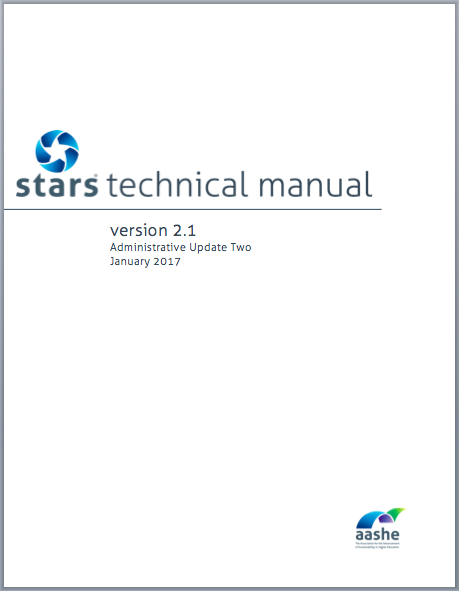Manuals and Tools
The following materials outline the minimum requirements and reporting criteria associated with STARS. The data collected for each credit is documented in the online Reporting Tool.
STARS 2.1
Credit Checklist
Download a snapshot of the credits included in the current version of STARS. To save the sheet for editing, select "File > Download as..." (for XLS format) or "File > Make a copy" (Google Drive users).
Technical Manual
Download the definitive guide to STARS credits and criteria (STARS Technical Manual v2.1.3, updated July 2017).
Current Credits
Download a zipped file containing all credits or download individual credits as PDF files. Right-click on a credit in the table below to copy a URL for sharing with data providers.
Supporting Materials
- Getting Started with STARS - share basic information about the STARS process and Reporting Tool with stakeholders.
- How to share credits with data providers (knowledge base article)
- Data Tracking Sheets - optional spreadsheets that can be shared with data providers. These files are made available for those institutions that like to supplement the online Tool with standalone spreadsheets for data collection and tracking purposes. Data must be entered into the online Reporting Tool independently.
- Exemplary Practice credits (current catalog)
Previous Versions
Archived versions of the Technical Manual are available, including detailed summaries of the changes made between each iteration.
Credit Development
The current version of STARS incorporates feedback and suggestions from hundreds of diverse stakeholders and experts (see the Technical Development Policy and archived versions of the Technical Manual).
The STARS governance structure collectively strives to ensure that each credit is objective, measurable, and actionable. STARS is designed to incorporate the full spectrum of sustainability achievement, and upper levels of achievement represent highly ambitious, long-term goals. Therefore there are some credits for which few, if any, institutions will achieve full points currently.
Given the diversity of higher education institutions, each STARS credit should be appropriate for most institution types. In order to accommodate this diversity, some STARS credits do not include detailed specifications but are instead flexible or open. In other cases, credits include an applicability criterion, so that the credits only apply to certain types of institutions. By following this approach, institutions are not penalized when they do not earn credits that they could not possibly earn due to their circumstances.

